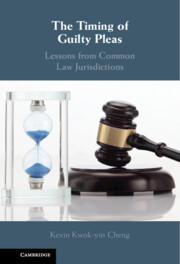Book contents
- The Timing of Guilty Pleas
- The Timing of Guilty Pleas
- Copyright page
- Dedication
- Contents
- Figures
- Tables
- Preface and Acknowledgements
- Table of Cases
- Table of Legislation
- Abbreviations
- 1 Introduction
- 2 The Sliding Scale of Sentence Discounts
- 3 Implicit (and Explicit) Plea Bargaining
- 4 Revisiting the Assumptions and Methodology
- 5 Factors Affecting the Timing of Guilty Pleas
- 6 Trial and Late-Plea Penalties
- 7 Consistency in Applying Sentence Discounts
- 8 Public Opinion and Sentence Discounts
- 9 Conclusion
- Index
4 - Revisiting the Assumptions and Methodology
Published online by Cambridge University Press: 22 December 2022
- The Timing of Guilty Pleas
- The Timing of Guilty Pleas
- Copyright page
- Dedication
- Contents
- Figures
- Tables
- Preface and Acknowledgements
- Table of Cases
- Table of Legislation
- Abbreviations
- 1 Introduction
- 2 The Sliding Scale of Sentence Discounts
- 3 Implicit (and Explicit) Plea Bargaining
- 4 Revisiting the Assumptions and Methodology
- 5 Factors Affecting the Timing of Guilty Pleas
- 6 Trial and Late-Plea Penalties
- 7 Consistency in Applying Sentence Discounts
- 8 Public Opinion and Sentence Discounts
- 9 Conclusion
- Index
Summary
This chapter revisits the assumptions that have dominated official discourse about ‘cracked trials’ and the utilitarian benefits of a sliding scale of sentence discount. First, it investigates whether defendants did ‘play the system’ before the implementation of the quantified sliding scale of sentence discounts. From the limited studies available, the answer to this question is mixed at best. Second, this chapter investigates whether the sliding scale of sentence discounts has helped the courts resolve their problem of cracked trials. Data before and after the introduction of the sliding scale of sentence discounts suggest that not much has changed in terms of guilty plea rates, cracked trial rates, and average waiting time until trial, bringing into question the usefulness of the sliding scale in promoting efficiency. The rest of the chapter details the methodology and datasets for this book, namely the Crown Court Sentencing Survey and the Hong Kong District Court dataset, paving the way for the analyses in proceeding chapters.
Keywords
Information
- Type
- Chapter
- Information
- The Timing of Guilty PleasLessons from Common Law Jurisdictions, pp. 69 - 91Publisher: Cambridge University PressPrint publication year: 2023
